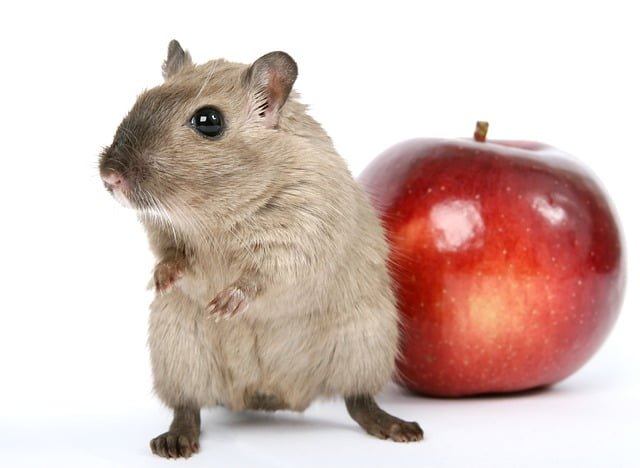Rats are omnivorous creatures and can eat a wide variety of foods. However, as pet owners, it’s important to be mindful of what we feed our furry friends. One question that often arises is whether rats can eat raw eggs.
The short answer is yes, rats can eat raw eggs. In fact, eggs are a good source of protein for rats. However, there are a few things to consider before feeding your rat raw eggs.
Firstly, rats can be prone to salmonella poisoning just like humans. While the risk of salmonella from raw eggs is relatively low, it’s still something to be aware of. Additionally, rats who are fed a diet too high in protein may develop health issues such as kidney problems. As such, it’s important to ensure that eggs are only given to rats as an occasional treat and not as a staple food item.

Understanding Rat’s Diet
Basic Dietary Needs
As omnivores, rats require a balanced diet that includes both plant and animal-based foods. Their diet should consist of protein, carbohydrates, fats, vitamins, and minerals. Rats also require access to fresh water at all times.
Protein is an essential component of a rat’s diet, and they require it to build and repair tissues. Good sources of protein for rats include cooked meat, eggs, and insects. Carbohydrates provide rats with energy, and they can get this from grains, fruits, and vegetables. Fats are also important for rats, as they provide energy and help to absorb vitamins. Rats can get fats from nuts, seeds, and oils.
Rats also require vitamins and minerals to maintain good health. Vitamin A is important for maintaining healthy skin and vision, while vitamin D is essential for bone health. Rats can get vitamins and minerals from fruits and vegetables, as well as from fortified foods.
Common Foods for Rats
When it comes to feeding rats, there are many options available. Some of the most popular foods for rats include:
- Pellets: Pellets are a convenient way to provide rats with a balanced diet. Look for high-quality pellets that contain a mix of protein, carbohydrates, and fats.
- Fruits and vegetables: Rats enjoy a variety of fruits and vegetables, including apples, bananas, carrots, and broccoli. These foods provide rats with vitamins and minerals.
- Cooked meat: Cooked chicken, beef, and pork are all good sources of protein for rats.
- Eggs: Eggs are a good source of protein for rats, and they can be served cooked or raw.
While rats can eat raw eggs, it’s important to note that raw eggs can carry salmonella. If you choose to feed your rats raw eggs, be sure to handle them carefully and wash your hands thoroughly after handling them. It’s also a good idea to limit the amount of raw eggs you feed your rats to reduce the risk of salmonella.
Raw Eggs and Rats
When it comes to feeding rats, it’s important to choose their diet carefully. One common question that rat owners have is whether or not it’s safe to feed their rats raw eggs. In this section, we’ll explore the nutritional value of raw eggs as well as the potential risks associated with feeding them to rats.
Nutritional Value of Raw Eggs
Raw eggs are a good source of protein and contain essential amino acids that rats need to maintain their health. In fact, a single raw egg contains around 6 grams of protein, making it a great addition to a rat’s diet.
In addition to protein, raw eggs contain other important nutrients such as vitamin A, vitamin D, and vitamin E. These vitamins are essential for maintaining healthy skin, bones, and muscles.
Potential Risks of Raw Eggs
While raw eggs can be a good source of nutrition for rats, there are also some potential risks to consider. One of the main risks is the possibility of salmonella contamination.
Salmonella is a type of bacteria that can cause serious illness in both humans and animals. If a rat consumes a raw egg that has been contaminated with salmonella, it can become sick and may even die.
To reduce the risk of salmonella contamination, it’s important to handle raw eggs properly. This includes washing your hands thoroughly after handling eggs, storing eggs in the refrigerator, and cooking eggs thoroughly before feeding them to your rat.
In conclusion, raw eggs can be a nutritious addition to a rat’s diet, but it’s important to be aware of the potential risks associated with feeding them. By handling eggs properly and cooking them thoroughly, you can help ensure that your rat stays healthy and happy.

Alternatives to Raw Eggs
Cooked Eggs
While raw eggs are not recommended for rats, cooked eggs can be a great source of protein for them. Hard-boiled eggs can be mashed and mixed with other foods to create a nutritious meal. Scrambled eggs are another option that can be mixed with vegetables or other protein sources to create a balanced diet.
It is important to note that eggs should be cooked thoroughly to avoid any risk of bacterial contamination. Additionally, eggs should not be the main component of a rat’s diet, but rather a supplement to their regular food.
Other Protein Sources
There are plenty of other protein sources that can be used in place of raw eggs for rats. Some options include:
- Cooked chicken or turkey
- Fish (cooked and boneless)
- Tofu
- Cooked beans (black beans, kidney beans, etc.)
- Cooked lentils
It is important to ensure that any protein source given to rats is cooked thoroughly and boneless to avoid any choking hazards. Additionally, it is important to vary their diet and not rely solely on one protein source.
By incorporating cooked eggs and other protein sources into a rat’s diet, you can provide them with the necessary nutrients without the risk of bacterial contamination from raw eggs.
Final Thoughts
In conclusion, rats can eat raw eggs, but it is not recommended as a regular part of their diet. Raw eggs can carry harmful bacteria that can make rats sick, and they may not provide all of the necessary nutrients for a rat’s health.
If you do decide to feed your rat raw eggs, make sure they are fresh and sourced from a reputable supplier. It is also important to only give your rat a small amount at a time, as too much can cause digestive issues.
Overall, it is best to stick to a balanced diet of commercial rat food, fresh fruits and vegetables, and occasional treats like cooked eggs or meat. As always, consult with your veterinarian if you have any concerns about your rat’s diet or health.

Frequently Asked Questions
What foods are safe for rats to eat?
Rats are omnivores, which means they can eat both plants and animals. Some safe foods for rats to eat include fruits, vegetables, grains, and lean proteins. It’s important to provide a balanced diet for your pet rat to ensure they receive all the necessary nutrients.
Is it okay to feed rats eggs?
Yes, rats can eat eggs. Eggs are a good source of protein and can be a healthy addition to your rat’s diet. However, it’s important to feed eggs in moderation and ensure they are cooked properly to avoid any risk of bacterial contamination.
Are scrambled eggs safe for rats?
Yes, rats can eat scrambled eggs. However, it’s important to avoid adding any seasoning or salt to the eggs as this can be harmful to your rat’s health. Plain, cooked scrambled eggs can be a healthy treat for your pet rat.
Can rats consume quail eggs?
Yes, rats can eat quail eggs. Quail eggs are smaller than chicken eggs, but they contain similar nutritional benefits. As with any egg, it’s important to cook them properly and avoid adding any seasoning or salt.
What are some foods to avoid feeding rats?
Some foods to avoid feeding rats include chocolate, caffeine, alcohol, and high-fat or high-sugar foods. These can be harmful to your rat’s health and may cause digestive issues or other health problems.
Can rats eat raw meat or eggs?
While rats can technically eat raw meat and eggs, it’s not recommended. Raw meat and eggs can contain harmful bacteria that can make your rat sick. It’s important to cook all meat and eggs thoroughly before feeding them to your pet rat.




